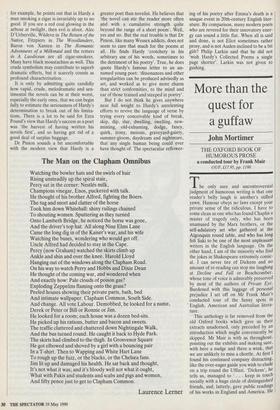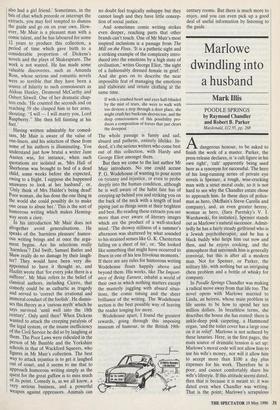More than the quest for a guffaw
John Mortimer
THE OXFORD BOOK OF HUMOROUS PROSE a conducted tour by Frank Muir OUP, £17.95, pp. 1198 The only sure and uncontroversial judgment of humorous writing is that one reader's belly laugh is another's stifled yawn. Humour obeys no laws except your private sense of the ridiculous. I have to come clean as one who has found Chaplin a master of tragedy only, who has been unamused by the Marx brothers, or the self-adulatory set who gathered at the Algonquin round table, and who has long felt Saki to be one of the most unpleasant writers in the English language. On the other hand, I am of the minority who find the jokes in Shakespeare extremely comic- al. I can never tire of Dickens and no amount of re-reading can stop me laughing at Decline and Fall or Beachcomber, whose tone of voice is admirably preserved by most of the authors of Private Eye. Burdened with this luggage of personal prejudice I set off on Mr Frank Muir's conducted tour of the funny spots in ' English, American and Australian litera- ture.
This anthology is far removed from the old Oxford books which gave us their extracts unadorned, only preceded by an introduction which might conveniently be skipped. Mr Muir is with us throughout, pointing out the exhibits and making sure, with here a nudge and there a wink, that we are unlikely to miss a chortle. At first I found his continued company distracting, like the over-eager guide you wish to elude on a trip round the Uffizzi. 'Dickens', he tells us, managed to ' . . . keep in touch socially with a huge circle of distinguished friends, and, latterly, gave public readings of his works in England and America. He also had a girl friend.' Sometimes, in the bits of chat which precede or interrupt the extracts, you may feel tempted to dismiss the guide and go on on your own. How- ever, Mr Muir is a pleasant man with a comic talent, and he has laboured for some 12 years to produce this collection, a period of time which gave birth to a considerable proportion of Dickens's novels and the plays of Shakespeare. The work is not wasted. He has made some valuable discoveries, such as Amanda Ross, whose serious and romantic novels were so terrible that they have been a source of hilarity to such connoisseurs as Aldous Huxley, Desmond McCarthy and • Osbert Sitwell. One of her dramatic chap- ters ends: 'He counted the seconds and on reaching 59 she clasped him in her arms, shouting: "I will — I will marry you, Lord Raspberry." She then fell fainting at his feet.'
Having written admirably for comed- ians, Mr Muir is aware of the value of one-liners, and his selection of these from some of his authors is illuminating. You understand just how brutal a writer Jane Austen was, for instance, when such quotations are isolated as, 'Mrs Hall of Sherborne was brought to bed of a dead child, some weeks before she expected, owing to a fright. I suppose she happened unawares to look at her husband', or, `Only think of Mrs Hulder's being dead! Poor woman, she has done the one thing in the world she could possibly do to make one cease to abuse her.' This is the sort of humorous writing which makes Heming- way seem a cissy.
In his introduction Mr Muir does not altogether avoid generalisations. He speaks of the 'harmless pleasure' humor- ous writing brings and at once the argu- ment begins. Are his selections really `harmless'? Did Swift, Samuel Butler and Shaw really do no damage by their laugh- ter? They would have been very dis- appointed to have it thought so, and Hazlitt wrote that `for every joke there is a sufferer'. Mr Muir refers to the belief of classical authors, including Cicero, that comedy could be as cathartic as tragedy and served to 'correct the irrational and immoral conduct of the foolish'. He dismis- ses this theory as a 'curious myth' which he says survived 'until well into the 18th century'. Only until then? When Dickens wanted to attack the creeping paralysis of the legal system, or the insane inefficiency of the Civil Service he did so by laughing at them. The Poor Laws were ridiculed in the person of Mr Bumble and the Yorkshire schools in that of Wackford Squeers, who figures in Mr Muir's collection. The best way to attack injustice is to get it laughed out of court, and it seems to me that to approach humorous writing simply as the quest for the great guffaw is to miss much of its point. Comedy is, as we all know, a very serious business, and a powerful weapon against oppressors. Animals can no doubt feel tragically unhappy but they cannot laugh and they have little concep- tion of social justice.
And sometimes comic writing strikes even deeper, reaching parts that other brands can't touch. One of Mr Muir's most inspired inclusions is a passage from The Mill on the Floss. 'It is a pathetic sight and a striking example of the complexity intro- duced into the emotions by a high state of civilisation,' writes George Eliot, 'the sight of a fashionably dressed female in grief.' And she goes on to describe the near impossible feat of managing the emotions and elaborate and ornate clothing at the same time.
If with a crushed heart and eyes half-blinded by the mist of tears, she were to walk with too devious a step through a door place, she might crush her buckram sleeves too, and the deep consciousness of this possibility pro- duces a composition of forces that just clears the doorpost.
The whole passage is funny and sad, absurd and pathetic, entirely lifelike. In- deed, it's the serious writers who come best out of this collection, with Hardy and George Eliot amongst them.
But then we come to the last author Mr Muir introduces. No one could accuse P. G. Wodehouse of wanting to pour scorn on tyranny and injustice, or even to probe deeply into the human condition, although he is well aware of the habit fate has of creeping up behind you and striking you on the back of the neck with a length of lead piping just as things seem at their brightest and best. Re-reading these extracts you are more than ever aware of .literary images which are the product of a well-stocked mind. 'The drowsy stillness of a summer's afternoon was shattered by what sounded to his strained senses like G. K. Chesterton falling on a sheet of tin', or, 'She looked like something that might have occurred to Ibsen in one of his less frivolous moments.' If there are any rules for humorous writing Wodehouse floats happily above and beyond them. His works, like The Import- ance of Being Earnest, inhabit a world of their own in which nothing matters except the masterly juggling with absurd situa- tions, the comic timing and the sheer brilliance of the writing. The Wodehouse section is the best possible way of leaving the reader longing for more.
Wodehouse apart, I found the greatest rewards, going through this imposing museum of humour, in the British 19th- century rooms. But there is much more to enjoy, and you can even pick up a good deal of useful information by listening to the guide.



































































 Previous page
Previous page